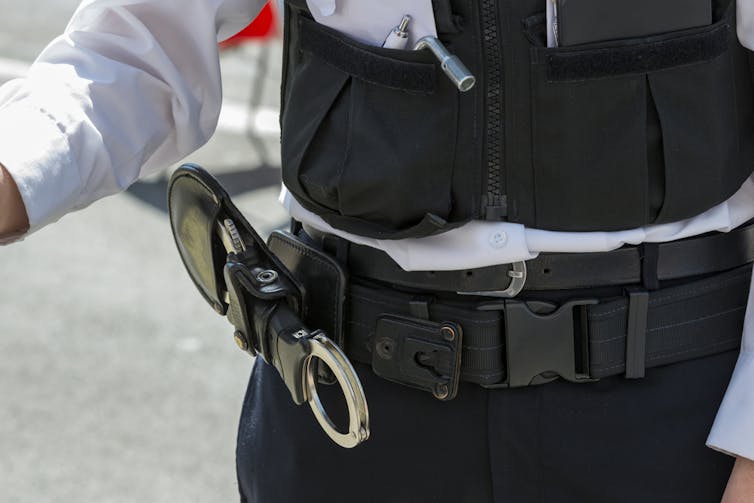We can all be a little radicalised: recognising this will help tackle extremism
The conviction of radical Islamist preacher Anjem Choudary for swearing allegiance to Islamic State shows that those breaking the law by inviting support for a terrorist organisation can and will be prosecuted. But it comes at a time when the British government is still struggling with definitions of extremism and radicalisation, and how to respond to those who don’t break the law. Parliament’s Joint Committee on Human Rights recently flagged up new concerns about the government’s counter-extremism strategy but we have had around a decade of these debates. Back in 2008, in the wake of the London 7/7 bombings, then Labour home secretary Jacqui Smith spoke of “extremist groups who are careful to avoid promoting violence”. The same year, the Department for Communities and Local Government created a list of British values: “human rights, the rule of law, legitimate and accountable government, justice, freedom, tolerance, and opportunity for all”. Vocal or active opposition to what are now known as fundamental British values has since been defined as extremism. This marks out certain attitudes as potentially dangerous, even if they do not incite violence. I say it’s time for a rethink, and that it should be through reclaiming the concept of radicalisation. On a journeyThe government has defined and tackled non-violent or “legal” extremism through a strategy known as Prevent. The Prevent duty requires public authorities to prevent people from being drawn into terrorism, and it also includes the promotion of fundamental British values. Those judged to be at risk of violent radicalisation can be referred to a multi-agency programme called Channel. Such programmes are founded on the idea that radicalisation is a process. This makes sense: people aren’t born terrorists, nor do they wake up one day with a whole new mindset. Radicalisation is something that starts small and can get bigger. But it can also be reversed – and often is; usually not ending in violence or other illegal behaviour. In my own ongoing work, I have examined the radicalisation journeys of both radical Islamist and far-right activists, using the term “micro-radicalisations” for the small parts of this journey. In 2009, in the months before the radical Islamist group led by Choudary called al-Muahjiroun and later Islam4UK was banned as a terrorist group in the UK, I spent nine months of my PhD fieldwork with a local branch of the group. I interviewed all but one of the six key activists, and spent many, many hours sitting with them at street stalls and attending their public meetings. One of the lead activists reflected on his time in secondary school. He had grown up in a Muslim family, but he was not “practising”, and used fasting as a way to wind up the teacher that eventually, he said, resulted in a physical confrontation and the teacher responding with “get back to your own country”. Another participant, a British National Party (BNP) activist interviewed for the same study, told me of feeling envious as the Asian children in his class got extra attention due to language difficulties. Others told me of experiences in their later teens and twenties, where they experienced police racism or conflict between ethnically defined gangs. Anger about one thing led to actions that would then be met with an angry response from others, creating a vicious cycle. Any involvement in a far-right or Islamist group ended up with further conflict with the police, other extremist groups or other young men just wanting to start a confrontation with the group, fuelling more anger. After the ban, some of the al-Muhajiroun interviewees went far enough to end up with terrorism-related convictions. 
Accusing everybodyThese earlier micro-radicalisations do not need to be justified by a fully thought out ideology either. The teenager’s fasting was a facet of young male rebellion, tinged with an incipient identity politics. Even in groups such as the BNP, English Defence League and al-Muhajiroun, many people drift away, for all sorts of political and personal reasons. Anger and even angry violence was clearly there in the backgrounds of the mainstream political and community activists I interviewed too. I met people who had been uncontrollable as kids and who felt that their activism as adults was them giving something back to their community. Others had discovered that getting involved in the local Labour party was a better way of getting the kinds of change they wanted to see. All this means that assuming that any particular microradicalisation is a pathway to terrorism will inevitably create many false positives – people who are accused of being dangerous to wider society but, in the end, are not. In fact, restrictions on free speech as a result of the Prevent strategy could affect many more people than those who would have gone on to violence or other law-breaking activities. These actions are the government’s own radicalisation, moving it towards more conflict. The Prevent programme is one-sided and its bias towards Muslims has led to it being described as “an exercise in Islamophobia”. A fairer approachOne alternative would be to take in all kinds of radicalisation – green, to the left and to the right, anarchists and more. We could restrict everyone’s speech and action, because we cannot predict which might be a threat in the future. But this would lead to real authoritarianism and end Britain’s commitment to free speech. My preferred approach would be to accept that all of us radicalise and de-radicalise at times, and that society and the state should not overreact. Where lines are drawn – especially between legal and illegal activities – they need to be set in neutral terms, and with a commitment to free speech and political debate. More important, however, is the need to make lower-level responses to any real or assumed radicalisation universal and positive, regardless of their origins. This should be based in a presumption of good will as opposed to a culture of suspicion. It should include helping people to engage in politics, even if some of their views are contentious, as a better way of resolving differences. We are not faced with a choice between banning some things and encouraging everything else.
Gavin Bailey, Research Associate, Policy Evaluation and Research Unit, Manchester Metropolitan University This article was originally published on The Conversation. Read the original article.
0 Comments
|
Archives
May 2022
Categories |
